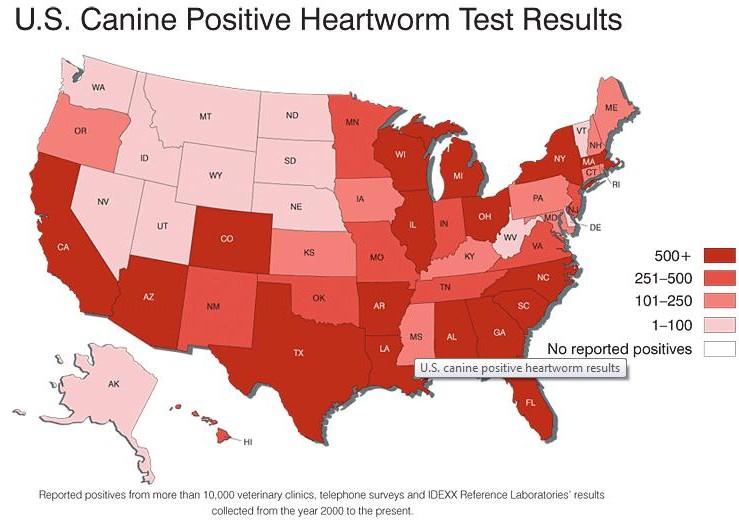Heartworm Disease and Your Pet
By epetsure

The Basics of Heartworm Disease
Heartworms disease is a potentially fatal disease in pets that is caused by foot long worms living in the heart, lungs, and associated blood vessels, causing severing lung disease, heart failure and even death. Heartworms can live inside dogs, cats and ferrets, but in rare instances, even humans. In the wild, heartworms are often found in coyotes, wolves, sea lions and foxes. Since foxes and coyotes often live in close proximity to urban areas, they are considered the most important carriers of the disease to avoid.
While it is difficult to pinpoint where Heartworm Disease is most prevalent, here is a map from 2013, indicating where the disease was most actively found.

The Transmission of Heartworm Disease
Heartworms are transmitted through mosquitoes. When a mosquito bites an infected animal, it draws in the baby worms running through the animal’s bloodstream. Then when the mosquito bites another animal, the larvae are deposited onto the surface of the animal’s skin and enter the new host animal through the infected mosquito’s bite wound.
Symptoms of Heartworm Disease in Dogs
There are few or no symptoms that present during the early stages of the disease. However, the longer the infection persists, or if the dog is active, heavily infected with heartworm, or has other medical conditions, signs of heartworm become more pronounced.
Symptoms include:
- A mild persistent cough
- Reluctance to exercise
- Fatigue after moderate activity
- Decreased appetite and weight loss
As the disease progresses, dogs may develop heart failure and a swollen belly caused by excess fluid in the abdomen.
Caval syndrome can develop in dogs with large numbers of heartworms. This is when a dog develops sudden blockages of blood flow in the heart causing a life-threatening form of cardiovascular collapse.
Symptoms include:
- Sudden onset of labored breathing
- Pale gums
- Dark bloody or coffee-colored urine
Testing for Heartworm Disease in Dogs
A simple blood test can show if your pet has Heartworm Disease. However, it takes up to six months after being infected for pets to test positive for Heartworm Disease. Therefore pets under the age of seven months can be started on Heartworm Prevention without a test. After that, dogs should be tested six months after your initial visit, then six months after that again, followed by annual testing. Dogs over the age of 7 months need to be tested before beginning preventative treatment.
Treatment of Heartworm Disease for Dogs
If your dog tests positive for Heartworm Disease, your vet will provide a treatment plan that includes restricting exercise, stabilizing your dog, and then treating your dog for Heartworm Disease. Once the treatment is complete, the vet will re-test your dog, and assuming the test comes back negative, the vet will re-start your dog on the Heartworm preventative treatment.
Heartworm Disease in Cats
While cats may have very few heartworms compared to dogs, even just one or two can cause severe illness for cats. Unfortunately, there is no treatment for cats. Therefore, treating a cat requires stabilizing the cat and providing veterinary care to treat the symptoms, and sometimes surgery to remove the heartworms if they do not pass on their own.
Cats can present with the disease in a very subtle or very obvious way. Symptoms include: coughing, asthma-like attacks, periodic vomiting, lack of appetite, or weight loss. Occasionally an infected cat may have difficulty walking, experience fainting or seizures, or suffer from fluid accumulation in the abdomen, like dogs. Unfortunately, the first sign in some cases is sudden collapse, or even sudden death.
Testing cats for Heartworm Disease is more complicated than testing a dog. Cats require a physical exam, an x-ray, a complete blood count and several other blood tests. An ultrasound may also be performed.
Cats are not ideal hosts for heartworms, and therefore some infections can resolve on their own. Unfortunately, heartworms in cats can migrate to other parts of the body such as the eyes, brain and spinal chord. Blood clots in the lungs and lung inflammation can develop when adult worms die in the cat’s body, but these are considered more severe complications.
Since there is no treatment for heartworms in cats, the best way to ensure your cat’s health is to stay up to date on the heartworm preventative treatment and have your cat tested annually, or as prescribed by your veterinarian.
Please check with you veterinarian for more information regarding heartworm disease and how you can protect your pets and keep them healthy.




